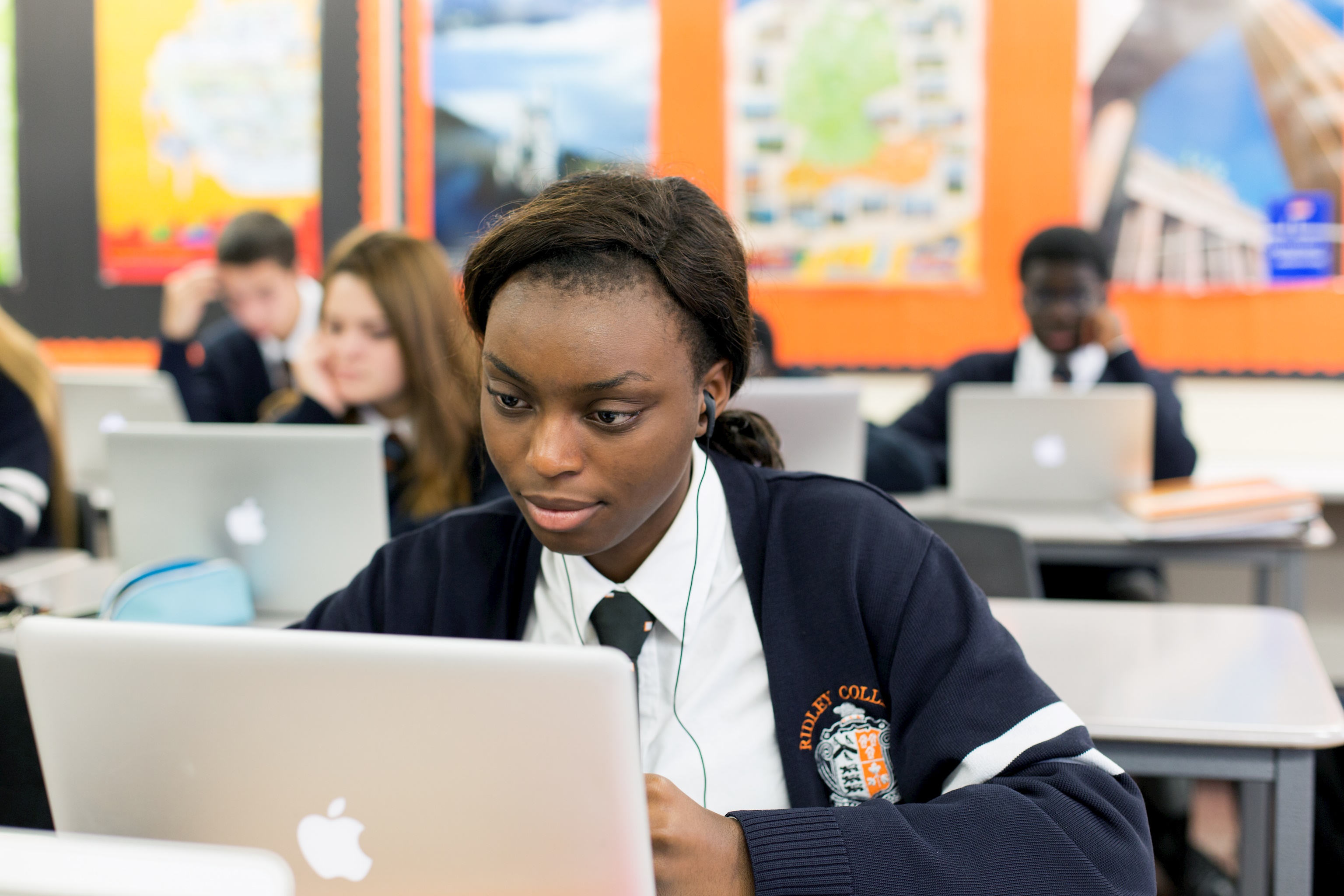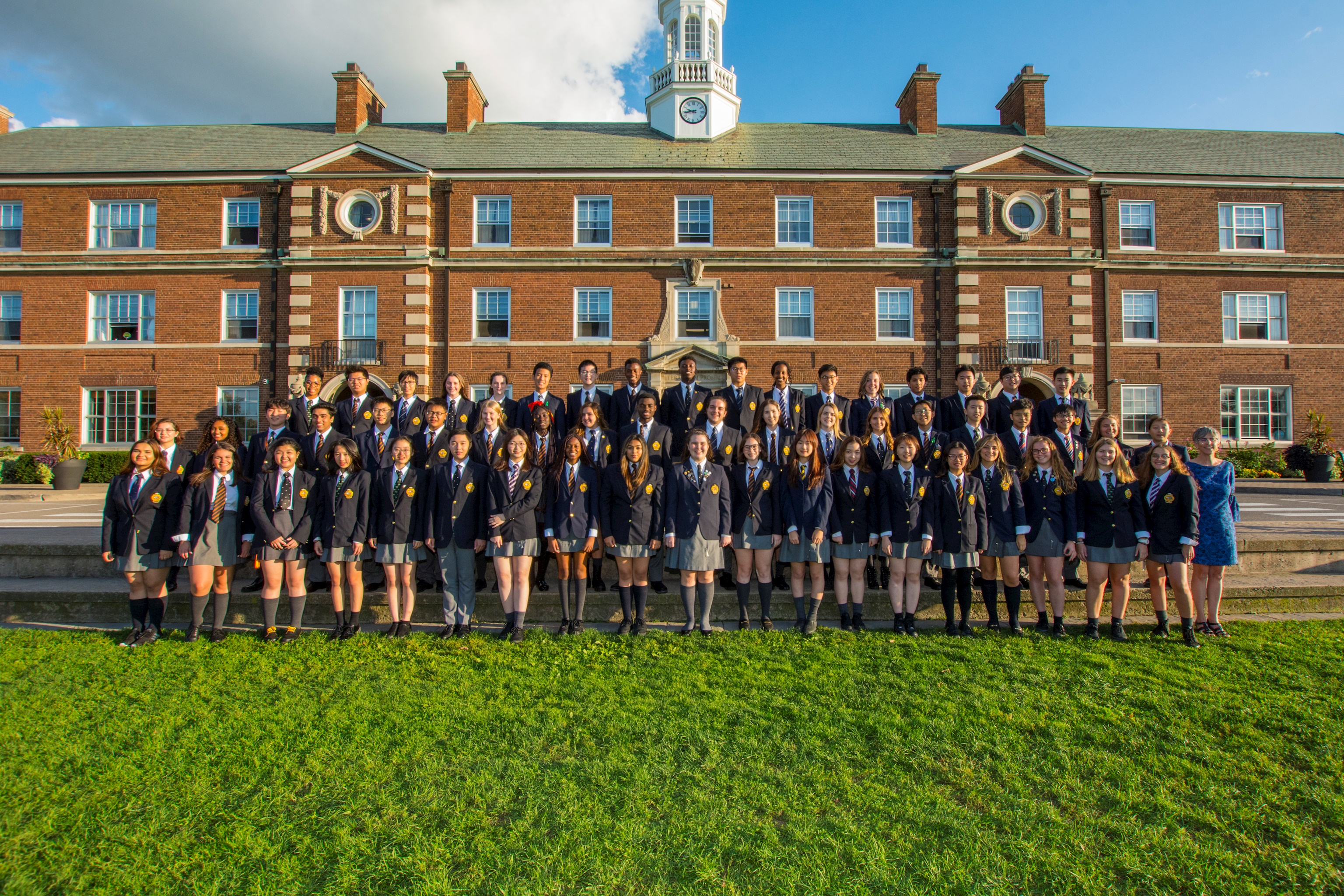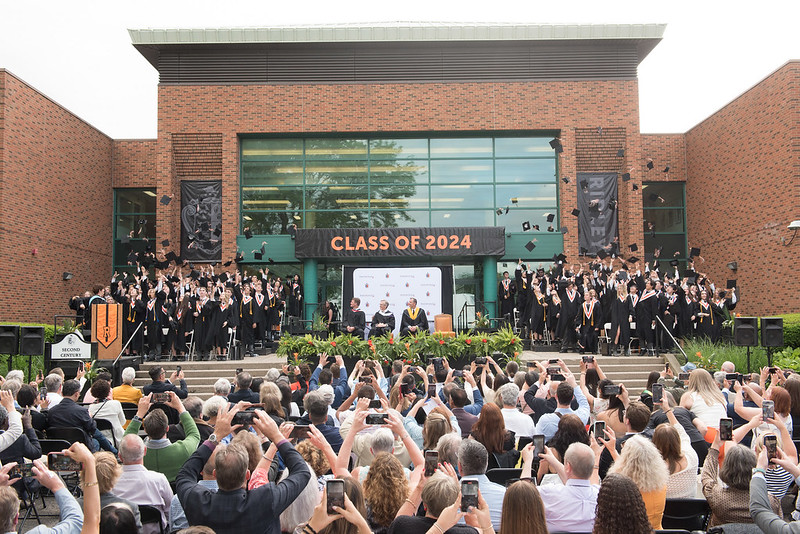At Ridley College, students have the opportunity to earn two diplomas upon graduating — the Ontario Secondary School Diploma (OSSD) and the highly regarded International Baccalaureate (IB) Diploma.
Ridley College is an International Baccalaureate (IB) World School and the only independent boarding school in Canada authorized to offer the IB continuum programme.
All Ridley students graduate having completed the OSSD, the standard high school diploma awarded to students who complete the provincial requirements in Ontario. However, in Grades 11 and 12, students have the option to enter the final programme in the IB continuum: the Diploma Programme.
We adopt an ‘open access’ policy for any student who wishes to undertake the challenge of the IB Diploma Programme. Students coming into the programme need no prior experience with the IB framework, and our learner-centred approach ensures all students adapt quickly and thrive.


The IB Diploma Programme Core
The IB curriculum is made up of the DP core:
The course has students investigate how they know what they know. It requires students to think deeply on topics that may seem rather simple on the surface but that can really be much more complex. Students are asked to use their lived experiences and the knowledge they learn in all their classes to explore open-ended questions.
This course is pivotal to the IB DP experience and runs across both years 1 and 2. In year 2, students write an essay addressing big questions posed by the IB. For example, in May 2025 some of the offered questions were:
- How can we reconcile the relentless drive to pursue knowledge with the finite resources we have available? Discuss with reference to the natural sciences and one other area of knowledge.
- To what extent do you agree with the claim that “all models are wrong, but some are useful" (attributed to George Box)? Discuss with reference to mathematics and one other area of knowledge.
- Does acquiring knowledge destroy our sense of wonder? Discuss with reference to two areas of knowledge.
IB Diploma Programme students write an independent, self-directed 4,000 word essay on a topic of special interest related to one of the six DP subjects. Throughout the process, they are guided by an advisor with whom they meet regularly to focus research and hone their writing. This proves to be valuable preparation for university as students develop the capacity to analyze, synthesize and evaluate knowledge.
Examples of essay topics which students have explored include:
- To what extent did Marie Antoinette's childhood influence her position on smallpox inoculation in France in the 1770s?
- How does colourism impact the mental health and self-esteem of female Asian-Americans?
- To what extent is there a relationship between the Brachistochrone problem and the ancient Chinese architectures' roof design?
- Can time delay cosmography of SN-Refsdal help provide clarity regarding the Hubble tension?
The IB programme encourages well rounded students through activities that give them experiences in creativity, action and service (CAS). They are required to lead a CAS project which includes tracking their participation in CAS activities with reflections throughout the process. Through this component of the Diploma programme, the IB has identified 7 key outcomes from CAS activities ranging from personal growth to perseverance to engaging with issues of global importance.

The IB Courses
In addition to the core, the DP framework is organized around six subject groups with different courses in each:
| IB English: Literature |
| IB English: Language and Literature |
| IB English: Literature and Performance |
| IB Chinese: Literature |
| Additional languages offered as self-study |
| IB French Level B (Advanced) |
| IB German ab initio (Beginner) |
| IB Mandarin ab initio (Beginner) |
| IB Spanish ab initio (Beginner) |
| IB Business and Management |
| IB Economics |
| IB Environmental Systems and Societies |
| IB History |
| IB Psychology |
| IB Biology |
| IB Chemistry |
| IB Computer Science |
| IB Design Technology |
| IB Environmental Systems and Societies |
| IB Physics |
| IB Math: Analysis and Approaches |
| IB Math: Applications and Interpretation (SL Only) |
| IB Film |
| IB Music |
| IB Visual Arts |
The Diploma programme enables students to reflect on the nature of knowledge, complete independent research and undertake a project, often involving community services. Students’ physical, intellectual, emotional and ethical flourishing are supported, and the programme concludes with them delivering an extended essay.
The Extended Essay is the best opportunity our students have to get a feel for the independence and rigour of university-level writing, with the benefit of one-on-one guidance from a supervisor.
— Saralyn Covent, Dean of Academics
OSSD
The Ontario Secondary School Diploma (OSSD) is a highly regarded diploma across Canada and around the world.
Ridley places great value on the completion of secondary education and is committed to helping every student earn an Ontario Secondary School Diploma (OSSD). All Ridley students graduate having completed the OSSD.
In order to earn an OSSD, a student entering Grade 9 must earn a minimum of 30 credits, including 18 compulsory credits and 12 optional credits. Students must also complete 40 hours of community involvement activities and must pass the Ontario Secondary School Literacy Test.
Full OSSD Requirements

OSSD/IB HYBRID
All Ridley students graduate having completed the OSSD; they may also earn the IB Diploma. All Upper School courses earn OSSD credits. Students who take a mixture of IB Diploma courses and OSSD courses are known as hybrid students. The hybrid programme appeals to students who want to take a wider variety of courses than are offered in the OSSD or who want to specialize with three or four courses in a single discipline.
Upper School Daily Schedule
These schedules are a generalized version of the Upper School daily schedule. The daily schedule for each Upper School student is unique based on their academic, co-curricular and sport interests.
Sample Weekday Schedule
| 7:00–9:00a.m. | Breakfast |
| 7:30–8:30a.m. | Morning Sport |
| 9:10–10:20a.m. | Period 1 |
| 10:25–11:35a.m. | Period 2 |
| 11:40a.m.–12:20p.m. | Assembly, Chapel or House Meetings |
| 12:20–1:20p.m. | Lunch |
| 1:20–2:30p.m. | Period 3 |
| 2:35–3:05p.m. | Multi-Subject Instructional Period* or Advisory |
| 3:10–4:20p.m. | Period 4 |
| 4:30–7:00p.m. | Co-Curriculars or Sport |
| 5:30–7:00p.m. | Dinner |
| 7:30–9:30p.m. | Study Hall and Teacher-Led Tutorials |
| 10:00p.m. | Curfew |
*Multi-Subject Instructional Period (MSIP) is offered three times per week and is a dedicated multi-purpose time built into the schedule for students to meet with teachers, complete unfinished academic tasks or homework.
Sample Saturday Schedule
| 7:15–8:45a.m. | Breakfast |
| 9:00a.m.–12:30p.m. | Co-Curriculars or Sport and Saturday Programming |
| 12:30–1:30p.m. | Lunch |
| 1:30–5:00p.m. | Co-Curriculars or Sport and Special Events |
| 5:30–6:30p.m. | Dinner |
OUR FACULTY
At Ridley, our faculty leaders are more than teachers or lecturers. They are mentors, life advisors and friends.
Being a student at Ridley is demanding, but our faculty are passionate about inspiring the students to develop in all aspects of life — mind, body and spirit. In addition to being masters of their craft and discipline, our teachers are expert learners who model curiosity, intellectual humility and a passion for lifelong learning. Together, we strive to lead our best lives and serve as adult mentors to young people who yearn to cultivate flourishing lives.
This is just a sample of some of our dedicated teaching professionals.




.jpg?command_1=resize&width_1=2543&height_1=1240)




.jpg?command_1=resize&width_1=260&height_1=345)















